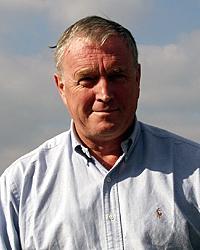
Recently on Cyclingnews.com |
News Feature, February 17, 2008
McQuaid: ASO's decision is a 'monumental folly'
By Shane Stokes

|
The past week has seen two big stories in cycling, namely ASO's rejection of Astana for its races - including the Tour de France - and also the news that the Opéracion Puerto investigation is to be reopened. As regards the former, UCI president Pat McQuaid has described the decision as 'insular' and 'a decision of monumental folly', while he is cautiously optimistic about the latter.
"Looking at this latest situation with Astana, there is absolutely no justification for the decision that was made," he told Cyclingnews this week. "This was a decision made in France by a French organisation purely for the French public. When you see the reaction in France, the reaction to this decision is positive there. For example, if you look at the Internet sites and the blogs of the French media, you will see that they are largely supportive of the decision. But outside France it is completely the opposite. Outside France, the international cycling public have a completely different view. They cannot understand why Astana should be singled out as the team who did so much damage to the Tour de France...everybody knows that there were four or five other teams who badly damaged the Tour last year."
McQuaid cited the Cyclingnews letters page as an example of this anger with ASO over its decision.
"Why should Astana be singled out?" he continued. "It is completely unjust. It is a collective punishment on riders who have absolutely no involvement in the Astana team of 2006 and the problems of 2006 and 2007. These riders are new to the team, there is a new management, and they have done everything in their power to put the right systems in place to ensure that the team is 100% correct. They are part of the biological passport programme, the same as every other team in these events."
In addition to that, Astana are paying what the team claims is €460,000 to Dr Rasmus Damsgard for him to implement his independent anti-doping programme. It means that this season, it has a stronger anti-doping policy than many other teams in the ProTour. McQuaid said that he has sympathy for the riders concerned, who are missing out on the chance to ride the Tour de France despite not being linked to doping.
"The problem to my mind is that the people who made this decision are not cyclists, they have never been cyclists. They don't understand, for instance, the hours and the work and the dreams of people like Alberto Contador, the amount of effort which he puts into trying to win the Tour de France. They don't understand that Levi Leipheimer, who was on the podium of the Tour de France last year, has probably spent every waking minute thinking of the Tour de France and of getting to a higher point on the podium.
"He is 34 years of age and this is probably his last opportunity to compete at such a high level in the Tour de France. They [the organisers] don't understand what it means to riders like that to compete in the Tour. They just take a decision taking them out of the Tour de France for whatever nationalistic reasons they do it, or whatever other reason...there are definitely ulterior motives in what they do, and I think that everybody in the cycling family know quite clearly what those ulterior motives are. It is completely unjust, it is incorrect and it is wrong."
As regards the Opéraction Puerto development, the full details of the new investigation have yet to be clarified. It means that the extent of the enquiry will only become clear as time passes. However McQuaid hopes that the reopening of the case could lead to sporting sanctions.
"We will have to see how far the investigation goes because it is now limited to an investigation into [Eufemiano] Fuentes and Merino [Batres]," he said. "It is to do with whether the transportation of the blood was correct. In other words, was it within the proper framework for transporting blood in terms of not being dangerous to public health? It is on that basis that it has been reopened."
While the focus of the case will not be on the doped athletes - namely the cyclists, and also the competitors from other sports rumoured to be involved - he thinks that there is a chance that more details may emerge which can then be used for sporting sanctions.
"When the case against them reopens, the judge may go and look for a further evidence, or [even] find further evidence. We will have to see then what the full details are; we haven't yet heard anything here officially from Spain, but it would seem that there is a good possibility that we could get more information and at least be in the position to deal with the files that we have out there at the moment with the various federations and various riders. These are all open and waiting for more information before they can be concluded."
DNA testing such as that which linked Jan Ullrich to some of the blood bags stored by Fuentes could possibly be used to incriminate - or, indeed to clear - some of the riders suspected of doping. McQuaid hopes that this takes place. "It depends on whether the authorities wish to allow that. But it seems that the Madrid High Court of Appeal has taken the view that the information in this file could be used for a sports disciplinary purposes, whereas [Judge] Serrano's view was that it could not be used for that. If that is the case, it would indicate the possibility that DNA testing could be done."
